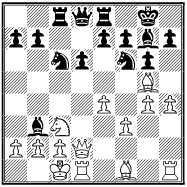
In a comment to one of
BDK’s recent posts, I mentioned some “historical” chess books that I enjoyed (you know, the kind that isn’t full of those annoying games and diagrams). He suggested that I turn that into a blog post and since he is a wise man, I am following his suggestion :) If you love chess and enjoy reading about the game and its origins, its famous protagonists with all their idiosyncrasies, and some crazy stories involving all sorts of crazy and not-so-crazy people, then don’t miss out on the following books.
Chess Bitch by Jennifer Shahade:
This book is mainly about women, stereotypes, and gender bias in the chess world. Shahade was US Women’s Champion in 2004 and has probably had the kind of exposure that puts her in a good position to comment on these issues. I believe this was her first book, and she clearly is no Shakespeare – but that wasn’t her goal I suppose. Shahade gives a good overview of strong female players past and present, provides entertaining anecdotes, and presents a lot of her own opinions and (often debatable) conclusions on topics such as women-only tournaments, the notion of “playing chess like a girl”, etc. The book could have been better organized, but I can say that it made for a very entertaining read.
End Game: Kasparov vs Short by Dominic Lawson:
This book is about the 1993 World Championship match between Kasparov and Short. The author is a friend of Short’s and it’s not surprising that a not-so-subtle anti-Kasparov tone prevails. I found this book to be absolutely fascinating. It’s full of drama, providing insights into the crazy mind games and psychological warfare on both sides, Short’s home preparation, and political nuances surrounding the match. Not to mention the ups and downs during the actual games. Highly recommended to any chess aficionado.
The Immortal Game by David Shenk:
This book traces the history of the game from its beginnings in Persia (ca. 500 A.D.) up to what it is today. Shenk is an excellent author and it shows in this very well written book. A very nice feature of the book is that Shenk sprinkles his chapters with the moves to the “Immortal Game” between Adolf Anderssen and Lionel Kieseritzky in London in 1851, so every now and then you get to enjoy a bite-sized portion of that classic game of the romantic era. The book’s sub-sub-title probably sums it up best: “"How 32 carved pieces on a board illuminated our understanding of war, art, science, and the human brain." Good stuff.
The Chess Kings by Calvin Olson:
This is by far the driest book of the lot, but if you want a pretty well-researched, scientific account of top level players, tournaments, and matches from the past and the present, this is it. The book provides an extensive bibliography, supplementary info, and a bunch of annotated games.
Bobby Fischer Goes to War by David Edmonds and John Eidinow:
The 1972 match between Spassky and Bobby Fischer was, without a doubt, the most notorious chess match ever. No other match has ever received the same kind of media coverage, and this duel sparked a chess renaissance not only in the US but other countries as well. After all, this was more than just a chess match – to many, it was a manifestation of the cold war. It was the single American chess genius against the mighty Soviet chess empire, trying to break the solid grip that Soviets had on the world champion title. This book was hard to put down. The authors did a great job conveying the tense atmosphere, the politics, the bickering, and Fischer’s antics. Don’t expect to see a lot of detail about the actual games – the book doesn’t provide that as the games have already been analyzed to death anyways. Bottom line – a very, very entertaining read.
King’s Gambit by Paul Hoffman:
As the sub-title to the book (“A Son, A Father, and the World's Most Dangerous Game") suggests, this book is part autobiography, part portrait of the crazy world of chess. The autobiographical part evolves around the author’s difficult relationship with his own father, tying it in with general observations about chess psychology. The book is full of colorful real-life characters (including Kasparov and many others), and there is no shortage of entertaining sub-plots – including a crazy trip to Libya for a chess tournament with spy-story-like qualities. I enjoyed Hoffman’s writing style, which you can get a taste of on his
blog.
The Chess Artist by J.C. Hallman:
Another fun excursion into today’s world of chess. The author meets and becomes friends with a master, and the reader can follow them on a journey exploring chess culture in the US (including tournaments, hustlers in Washington square park, games on ICC etc). The focal point of the book is a trip to the Russian province of Kalmykia, whose president is Kirsan Ilyumzhinov – yep, the same guy that’s president of FIDE. While in Kalmykia, the two protagonists try to meet with Ilyumzhinov, who proves to be somewhat elusive. At the same time, they set out to explore the odd little “Chess City” built by Ilyumzhinov, with its crown jewel, the “Chess Palace” – a glass pavilion dedicated to nothing but chess. Overall, I found the book to be entertaining while at times it was a little “slow”. If I had to chose, I’d prefer “King’s Gambit” over this one, but if you’re addicted to chess (which you probably are if you’re reading this), I am sure you will enjoy “The Chess Artist”.
I'd love to hear other recommendations or opinions on these books.












